|
|
|
Sort Order |
|
|
|
Items / Page
|
|
|
|
|
|
|
| Srl | Item |
| 1 |
ID:
085932
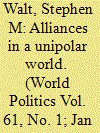

|
|
|
|
|
| Publication |
2009.
|
| Summary/Abstract |
An alliance (or alignment) is a formal (or informal) commitment for security cooperation between two or more states, intended to augment each member's power, security, and/or influence.
|
|
|
|
|
|
|
|
|
|
|
|
|
|
|
|
| 2 |
ID:
105338
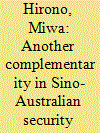

|
|
|
|
|
| Publication |
2011.
|
| Summary/Abstract |
This paper examines how China has played a "responsible" role in international humanitarian post-disaster assistance by taking the example of China's assistance to post-tsunami Aceh, and explores policy implications with regard to future Sino-Australian security cooperation. China and Australia took inconsistent approaches to assistance in Aceh, which derived from their different understandings of international "responsibility". However, the inconsistencies do not necessarily hamper cooperation between the two. Rather, it is because of these inconsistent approaches that the two countries' cooperation can develop into comprehensive and multifaceted assistance. The key to successful cooperation between the two countries, this paper argues, is the notion of "complementarity". In policy documents on bilateral relations, Chinese and Australian policymakers emphasize the "economic complementarity" between the two, but this "complementarity" is also useful when the two explore the way in which they will cooperate on security issues. One example of this complementary approach with regard to assistance for Aceh is the Australian effort to promote stability in both tsunami and non-tsunami affected areas, and Chinese economic investment in Aceh, in keeping with the Acehnese local expectations of long-term economic development and more employment opportunities, which are the foundation stones of stability. While these efforts are not consistent, they are highly complementary to each other, and have great potential to encourage peace and stability in Aceh.
|
|
|
|
|
|
|
|
|
|
|
|
|
|
|
|
| 3 |
ID:
118941
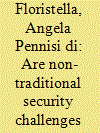

|
|
|
|
|
| Publication |
2013.
|
| Summary/Abstract |
How are regional organizations responding to the emergence of non-traditional security (NTS) challenges? Are they engaging in more cooperative efforts to meet new threats? Or, on the contrary, do they react in different manners according to their distinctive values, principles and internal structures? This article attempts to investigate how the threats posed by NTS are compelling different regional organizations to reconsider their security thinking and to find new innovative ways of cooperation. This is done by comparing two diverse regional organizations, the EU and the Association of Southeast Asian Nations (ASEAN), whose models of security cooperation have significantly varied reflecting the preference for different security approaches. The EU's security system has been more formalized and institutionalized; conversely, the "ASEAN way" has traditionally been rooted in the principles of informality and consensus. It is argued, however, that the emergence of NTS threats is acting as a catalyst behind a normative and operational shift of the modus operandi of both organizations. In so doing, this empirical analysis will try to shed light on the effects of exogenous factors on the emergence of patterns of convergence within the security sphere of distinctive regional processes.
|
|
|
|
|
|
|
|
|
|
|
|
|
|
|
|
| 4 |
ID:
063736
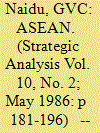

|
|
|
| 5 |
ID:
104349
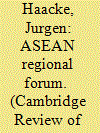

|
|
|
|
|
| Publication |
2011.
|
| Summary/Abstract |
This article examines to what extent the Association of Southeast Asian Nations (ASEAN) Regional Forum (ARF) has moved beyond dialogue to practical security co-operation. Focusing on terrorism, maritime security and disaster relief as key areas of ARF activities in the past few years, the paper offers four arguments: first, while the ARF primarily remains a forum for regional security dialogues and confidence building, its participants have slowly become prepared to proceed with practical security co-operation, albeit only in limited ways. To the extent that desktop and field exercises take place under ARF auspices, most have been organized in the area of disaster relief. This implies, second, that for the most part ARF participants are still pursuing capacity building and operational security responses outside the Forum. Third, the ARF's cautious embrace of practical co-operation is not the outcome of ASEAN's exercise of diplomatic centrality but the result of initiatives pursued by a small group of ASEAN and some non-ASEAN states. Fourth, at least in the short term, any expectations that participants might organize significantly more demanding practical activities under ARF auspices are premature.
|
|
|
|
|
|
|
|
|
|
|
|
|
|
|
|
| 6 |
ID:
065612
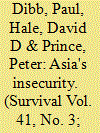

|
|
|
| 7 |
ID:
121408


|
|
|
|
|
| Publication |
2013.
|
| Summary/Abstract |
During the 2001-2009 period when American foreign policy was internationally unpopular and perceived as unilateral, many states strengthened their security cooperation with the United States and facilitated the reach of the us military. This behavior spans a range of actions along a spectrum from reaffirming traditional alliances to far more subtle forms of alignment. This pattern is in large part driven by the actions of regional powers such as Russia and China whose rising power pushes neighboring states to seek the assurance of the United States, and it has distinct implications for the endurance of American hegemony. As those regional powers seek to expand their influence, secondary states may increase their contributions to the maintenance of American hegemony, thus helping to extend it well into the future. They are less prone to do so, however, if the United States follows a strategy of restraint that calls into question its willingness to defend its hegemony. Therefore, a policy focused on maintaining American military preeminence and the demonstrated willingness to use it may be what sustains the cooperation from second-tier states that helps to maintain American hegemony.
|
|
|
|
|
|
|
|
|
|
|
|
|
|
|
|
| 8 |
ID:
059187
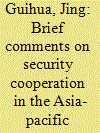

|
|
|
| 9 |
ID:
131444


|
|
|
|
|
| Publication |
2014.
|
| Summary/Abstract |
The British government is in the process of re-energizing its relations with the Gulf states. A new Gulf strategy involving a range of activities including more frequent elite bilateral visits and proposals sometimes touted as Britain's military 'return to east of Suez' are two key elements of the overarching strategy. Such polices are designed to fall in line with British national interest as identified by the government-authored 2010 National Security Strategy (NSS), which emphasizes the importance of security, trade, and promoting and expanding British values and influence as perennial British raisons d'etat. In the short term, the Gulf initiatives reflect and compliment these core interests, partly based on Britain's historical role in the region, but mostly thanks to modern day trade interdependencies and mutually beneficial security-based cooperation. However, there is yet to emerge a coherent understanding of Britain's longer-term national interest in the region. Instead, government-led, party-political priorities, at the expense of thorough apolitical analysis of long-term interests, appear to be unduly influential on the origins of both the Gulf proposals and the NSS conclusions themselves. Without a clear strategic, neutral grounding, both the Gulf prioritization and the NSS itself are weakened and their longevity undermined.
|
|
|
|
|
|
|
|
|
|
|
|
|
|
|
|
| 10 |
ID:
090546
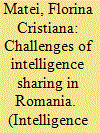

|
|
|
|
|
| Publication |
2009.
|
| Summary/Abstract |
The twenty-first century's security environment has triggered a phenomenon of 'proliferation' of intelligence and security cooperation, both domestically and internationally. After the ousting of the communist regime (whose intelligence system served the regime) in 1989, Romania embarked upon democratic reform of its new intelligence system (including strengthening cooperation), to better tackle the current security challenges. This has been a rather onerous process, yet worthwhile: Romania's intelligence is presently cooperating well with national and international partners, to counter national, regional, and global security threats. This paper assesses Romania's efforts in developing intelligence cooperation, after the demise of the communist regime.
|
|
|
|
|
|
|
|
|
|
|
|
|
|
|
|
| 11 |
ID:
102786


|
|
|
|
|
| Publication |
2011.
|
| Summary/Abstract |
This paper explores how China's strategic motivations and calculations have both motivated and constrained its participation in East Asian regional cooperation. It argues that China's participation in regional economic and security cooperation is motivated first of all by the calculation of China's domestic interests to create a peaceful peripheral environment for its economic growth and political stability, particularly its frontier security and prosperity. The realist interests to enhance China's position in power competition with other major players in the region, particularly Japan and US, also play an important part in China's strategic calculation. These interest calculations, however, also set limits on China's participation in regional cooperation. These interest calculations have also shaped China's preference for an informal approach, emphasizing voluntarism and consensus building rather than legally binding resolutions, toward regional cooperation. This soft approach is a major barrier for many regional institutions to move beyond the stage of talking shops to effectively resolve conflicts in the region.
|
|
|
|
|
|
|
|
|
|
|
|
|
|
|
|
| 12 |
ID:
054025
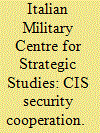

|
|
|
|
|
| Publication |
Moscow, Institute for Strategic Studies,
|
| Description |
87p.
|
|
|
|
|
|
|
|
|
|
|
|
Copies: C:1/I:0,R:0,Q:0
Circulation
| Accession# | Call# | Current Location | Status | Policy | Location |
| 044014 | 355.033047/ITA 044014 | Main | On Shelf | General | |
|
|
|
|
| 13 |
ID:
102655
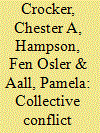

|
|
|
|
|
| Publication |
2011.
|
| Summary/Abstract |
This article surveys current security challenges and identifies obstacles to effective global and regional responses and cooperation in an era when security has become increasingly divisible. The new situation is partly explained by the complexity and variety of security challenges, both traditional and new, and by the linkages between them. It argues that a new pattern of improvised, ad hoc and often case-specific security mechanisms has developed, which it calls Collective Conflict Management (CCM). The argument is illustrated by reference to cases of CCM where a wide range of actors-multilateral institutions at the global and regional levels, individual states or ad hoc coalitions, professional and commercial bodies, and non-governmental organizations-collaborate in an effort to manage specific security threats and challenges, bringing together a variety of relationships, resources and skills. The urge for collective action, rather than unilateral or single actor-led, is motivated by a number of factors and 'drivers", not all of them necessarily positive or constructive. The article concludes that the success or failure of CCM will depend in part on the severity of the problems it faces and in part on the motives and incentives behind collective responses. This new pattern raises interesting and important questions for the future of international security. While CCM may be untidy and lack clear norms and standards, in many cases it may be the best available in an increasingly fractured world.
|
|
|
|
|
|
|
|
|
|
|
|
|
|
|
|
| 14 |
ID:
181695
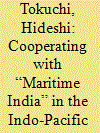

|
|
|
|
|
| Summary/Abstract |
The main purpose of this article is to identify a common basis for Japan and India as maritime democracies to work together for the maintenance and enhancement of the rules-based liberal international order at sea in the face of a variety of challenges in the Indo-Pacific region, China’s maritime advancement in particular. As powerful maritime democracies in the Indo-Pacific, Japan and India will be able to engage in a wide variety of maritime security cooperation. The opinions of security experts of both countries should be mustered so that bilateral cooperation keeps up its momentum. Synergy of Tracks 1, 1.5 and 2 dialogues should be pursued for maritime security cooperation. In this bilateral effort, the US-centred alliance network, of which the Japan-US Alliance is the central portion, and India’s autonomous and multi-directional approach toward international security must be intertwined effectively. Also, security dialogues between the two countries and between the two navies should work out the division of labour between Japan and India to contribute to the Indo-Pacific regional maritime security more effectively.
|
|
|
|
|
|
|
|
|
|
|
|
|
|
|
|
| 15 |
ID:
180205
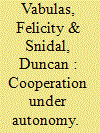

|
|
|
|
|
| Summary/Abstract |
Informal intergovernmental organizations (IIGOs) such as the Proliferation Security Initiative and G20 increasingly play a central role in governing international relations. IIGOs are based on recurrent meetings among high-level state representatives but are not legalized through a treaty and have no permanent secretariat. They allow states to organize internationally without sacrificing autonomy to a supranational entity. We present the IIGO 2.0 dataset, the most comprehensive compilation of these institutions to date, and illustrate the significance of IIGOs through several key empirical findings. First, while the creation of formal IGOs (FIGOs) has plateaued, states are increasingly creating IIGOs to address critical global issues. Second, states disproportionately use IIGOs for high politics issue areas including peace, security, and political agenda-setting which challenges conventional wisdom that IGOs (intergovernmental organizations) are less relevant in the security realm. Third, IIGOs are remarkably durable. Although states could readily formalize or abandon IIGOs, they generally organize cooperation informally for long periods. Finally, IIGOs are typically smaller than FIGOs and this design choice is increasingly used by states of all levels of development, power, and region. The availability of the IIGO 2.0 dataset will promote further analysis on the growing diversity of international institutions.
|
|
|
|
|
|
|
|
|
|
|
|
|
|
|
|
| 16 |
ID:
087928
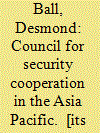

|
|
|
|
|
| Publication |
Canberra, Research School of Pacific and Asian Studies, 2000.
|
| Description |
120p.
|
| Standard Number |
0731527801
|
|
|
|
|
|
|
|
|
|
|
|
Copies: C:1/I:0,R:0,Q:0
Circulation
| Accession# | Call# | Current Location | Status | Policy | Location |
| 044148 | 341.72/BAL 044148 | Main | On Shelf | General | |
|
|
|
|
| 17 |
ID:
090665
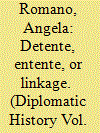

|
|
|
|
|
| Publication |
2009.
|
| Summary/Abstract |
A significant relaxation of tensions between East and West occurred after the mid-sixties. Between 1963 and 1968 an increasing dialogue between the superpowers started to develop. Its genesis was in the Soviet achievement, in 1964-65, of the second-strike capability on nuclear weapons, which meant the possibility of mutual assured destruction (MAD) in case of war. The imminent strategic parity between the superpowers created the balance of terror-deterrence-and engendered the political will to pursue limitation to the nuclear armaments race and to define rules to manage the nuclear arsenal. In October 1966, duringa speech in New York, U.S. President Lyndon B. Johnson invited the Soviet Union to resume the détente process by agreeing on military troop reductions on both sides in order to create an increasing reconciliation in Europe.2 Two years later, on July 1, 1968, the Nonproliferation Treaty was signed and created the basis for managing the world nuclear arsenal.
|
|
|
|
|
|
|
|
|
|
|
|
|
|
|
|
| 18 |
ID:
059591
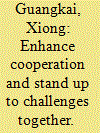

|
|
|
| 19 |
ID:
105620


|
|
|
| 20 |
ID:
137420
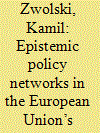

|
|
|
|
|
| Summary/Abstract |
This paper offers insights into an innovative and currently flagship approach of the European Union (EU) to the mitigation of chemical, biological, radiological, and nuclear (CBRN) risks. Building on its long-time experience in the CBRN field, the EU has incorporated methods familiar to the students of international security governance: it is establishing regional networks of experts and expertise. CBRN Centers of Excellence, as they are officially called, aim to contribute to the security and safety culture in different parts of Africa, the Middle East, South East Asia, and South East Europe, in the broadly construed CBRN area. These regional networks represent a modern form of security cooperation, which can be conceptualized as an epistemic policy networks approach. It offers flexibility to the participating states, which have different incentives to get involved. At the same, however, the paper identifies potential limitations and challenges of epistemic policy networks in this form.
|
|
|
|
|
|
|
|
|
|
|
|
|
|
|
|
|
|
|
|
|